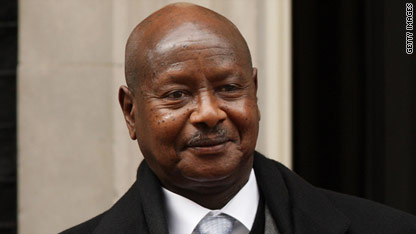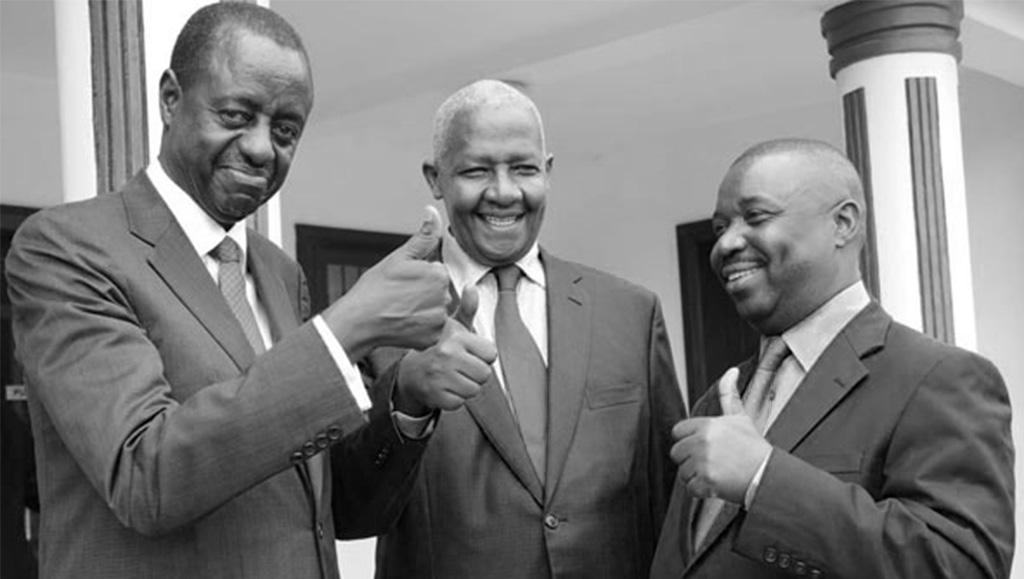“You can’t have organized crime without law and order” is a quote in the popular television series “Gotham”. But it may as well have been about the legitimacy racket that is the familiar story across the continent where agile but aging strongmen have discovered the secret to staying power is embracing democracy not fighting it.
The longevity of rule through their iron grip over all aspects of the formal reproduction of power from elections, to the courts and civil service, has emerged as a new way for traditional western powers, and now China to interact with African sovereignty from Cameroon down to Uganda.
A bootleg copy of “Gotham” costs just $42 cents per season on the streets of Kampala. American network shows are a favorite distraction for the hundreds of thousands of unemployed youth – in one of the youngest countries in the world. But in Uganda labor is the largest export (judged by remittances from Ugandans living abroad) not the biggest source of opportunity for change at home.
Along parliamentary avenue hungry but educated job hunters often carrying brown envelops with their degree awards, bag snatchers and phone thieves mix freely with the money lenders who prey on lawmakers and other well-heeled con-men Ugandans refer to as bafeere. However, it is the violent hitmen with political connections known as Kifeesi that strike the most fear in the heart of Ugandans. The outsourcing of political violence to unemployed young men has been of the major issues for public debate in the country. Poverty has risen by seven points to nearly 30% according to the nationwide household survey conducted by the national statistics bureau.
In urban areas, the response of the ruling party has been to weaponize poverty – putting organizations of mostly young men under “youth livelihood programs” and directing their anger at opposition politicians. The police have been accused of looking the other way when the same groups of young men engage in violent robbery.
In one bizarre episode, just days before President Yoweri Museveni signed into law constitutional amendments that would allow him stay in power indefinitely, a group of self-avowed Kifeesi held a press conference broadcast nationally to say they would not commit murders and other crimes during the festive season as a gift to the public. Police briefly detained its spokesman and leader but released him afterwards.
Earlier at the height of opposition protests against the age limit, a prominent association of motorcycle taxi riders (known as boda bodas) signed up to the Yes Campaign of the President shocked the public when they were shown stopping a school bus on a main highway. They then accosted teachers and pupils apparently for dressing in red outfits a colour used by the No campaign. In the video footage which went viral on social media, the group was seen warning the political opposition in full view of police officers, one of who was openly assaulted.
No serious charges have so far been brought against any of the vigilantes who opposition leaders have long claimed are armed and trained by the security services as additional muscle for the ruling National Resistance Movement. In January the military disbanded the groups leadership but skeptical readers will note this not as a law and order matter but a political one.
President Museveni blames the increased crime and insecurity on corruption in the police and lapses in use of modern crime detecting methods. He also blames the opposition for the lack of jobs – for creating a toxic environment that scares away investment from the country.
In this pirated version of democracy and development however, a vibrant electoral system, corrupt and commercialized sustains, the myth of the eternal presidency as a source of predictability and stability.
Conventional wisdom may suggest otherwise. It could claim, for example, that joblessness and despondency of young people have the potential to explode into street violence or popular protests.
They do.
Indeed, rising crime, drug use, violent disputes over land and water resources and protests over inadequacy of most government supplied services – mostly involving young people are constant din that echoes the call by opposition politicians about the need for a transfer of power.
But these are unconventional times.
Uganda, which saw a spate of short-lived governments that were violently overthrown after independence, 30 year olds now make up over 70 percent of the population. They have never seen a peaceful handover of power from one president to another. They do not know any other President other than Yoweri Museveni in power since 1986. Together with an older generation – they have never witnessed a life presidency either. This is a new experience – and not necessarily a bad one.

Unlike the turbulence of the post-independence era which heralded the initial Africa rising optimism, in Uganda today there is no revolving door to the presidency. It is walled off. Before the New Year’s Day, around the time he signed into law amendments to the Uganda constitution that extended his 31-year rule indefinitely, President Yoweri Museveni was pictured with some of his own grand children – playing chess. The online reaction was scathing but also highly polarized. Supporters see the 73-year old as an anchor of stability while his detractors say he is the source of it – because it is a stability obtained at a huge financial cost.
But a real, if often ignored feature, of the perpetual African presidency is how it is reshaping democracy itself.
Outside the presidency however politics is an opportunity for all affair with unprecedented representation in all areas. According to the Uganda Electoral Commission elected positions top 1.7 million, a figure more than quadruple the size of the civil service, the courts and army combined. 312 members (of Uganda’s 424 seat parliament) who endorsed constitutional amendments that removed the age limit – a technical impediment to extending the rule of Mr. Museveni are part of a ritual of renewal every election when over 65% of incumbents lose their seats.
It is an intense political ecosystem that is dominated by money and bribery.
According to the Alliance for Campaign Finance Monitoring in the 2016 election over $700 million was spent – mostly by candidates in the poll. This is likely a conservative estimate. The biggest loser of this retail success of electoral democracy is the opposition. While the ruling party, the National Resistance Movement attracts the most interest in potential candidates (the logic of most is to protect their personal investment by competing under the ruling party flag) the basic cost of $100 thousand per constituency is borne by all candidates.
The cohesion of opposition parties is thus bifurcated especially when once elected candidates belong not only to the political party – but the political class distinguished by the high remuneration of a Member of Parliament. Party officials who are not MPs have little to no leverage when politicians collectively bargain on their wages, for example, when the Executive low on legitimacy fuel comes calling for cheap refills.
One of the surprises of the lifting of age limits were the transition clauses added by the House – to extend its own tenure by two years – a cost of nearly a trillion extra Ugandan shillings ($300 million dollars) when their present term closes in 2021. Unlike 2005, when term limits were lifted (they have since been returned) when MPs received a $3000 “facilitation” fee, the present bargain is more complex and speaks to a settled political culture.
The alternative for Museveni and the NRM could have been a referendum on the age limit but after nationwide protests led by opposition leaders – and a more troublesome proposal on compulsory acquisition of land on the table, limiting the process to parliament appeared more practical. As for MPs, a two-year extension and bigger financial war chest can help with the next election when Ugandans may be less angry about the continuous presidency that most have only known as a fact of life.
This is a protection racket for a political system that is dynamic and vast in the middle and at the bottom. One ruling party politician aptly described it as a Ponzi scheme.
Perhaps but what it is not is a non-democracy.
In the last election, a professional comedian was elected MP and one of the most notable political actors in the opposition is a local reggae artist Robert Kyagulanyi – a.k.a Bobi Wine. The success of long surviving leaders and their political machines is therefore testimony to the disruptive power of incumbent presidencies to sap the substance of democratic decision making but retain their forms – under their personal brand names.
While the lack of jobs and increasing crime in urban centers, such as a brutal string of rapes and murders near the official residence of the President in Entebbe, are major public concerns, the ruling party appears safe from its own politicians.









